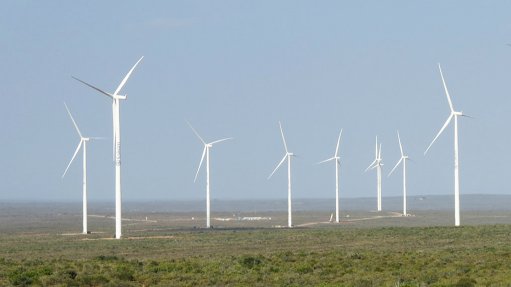Power outages exacting toll on Ford’s PE engine plant
While Ford Motor Company of Southern Africa (FMCSA) did not have “significant issues” with power supply in Gauteng, it was a different story in the Eastern Cape, said FMCSA and American Chamber of Commerce in South Africa president Jeff Nemeth earlier this month.
Hosting US Under Secretary for Economic Growth, Energy and the Environment Catherine Novelli, at FMCSA’s Ranger assembly plant, in Pretoria, he said the company’s engine plant in Port Elizabeth had suffered 90 power outages over the last 12 months.
Nemeth said the engine plant was essentially a machining operation using high-speed equipment that required a specific shutdown process. If this shutdown process was not followed, and the power went out, even for five or ten minutes, the plant lost “a couple of hours”, as technicians had to repair the equipment affected by the outage.
Repair and spares costs were also high.
“I tend to put everything in the context of competitiveness,” noted Nemeth.
“How can my operation be globally competitive, especially as it exports to 150 countries? If I don’t have a competitive product at a competitive cost level, then I won’t sell my vehicles. I’ll lose production and jobs here in South Africa.
“So, [power] is a problem down in Port Elizabeth, and that is where we are having most of our discussions right now around alternative energy sources to make sure we have a sustainable, uninterrupted power supply.”
Stable labour supply and transport issues, such as port congestion, were also of concern to Ford’s operations in South Africa, said Nemeth.
He said it was a challenge to convince Ford’s management to continue investing in a country where the output of product was less stable than in other countries.
Nemeth expressed concern about the frequency and length of strikes in South Africa.
He hopes to soon see a round of collective bargaining in South Africa that does not result in extensive strikes.
He also laments the fact that multinational companies are unable to fulfil black economic-empowerment requirements in terms of ownership, which could see it lose out on business opportunities.
Nemeth last week reiterated Ford’s commitment to manufacturing in South Africa, despite the power and labour challenges.
Ford had grown its market share in the South African market from around 6% in 2010 to 13.4% in September this year.
“We have been here for 90 years. We work through [the challenges] and we make it work. We make it work by investing in our operations, by investing in our people and by investing in our communities,” he noted.
Nemeth said a continuous drive to improve quality, efficiency and stability of supply would ensure Ford’s success and continuous investment in South Africa.
Another positive would be the development of a pan-African trade agreement that would ease exports from South Africa into the continent.
“This will give us access to many more customers, we will make better returns on our foreign direct investment here in South Africa, and it will drive the growth of our business throughout the continent. We feel that this is really important,” said Nemeth.
He added that the current weakness of the yen made it difficult to compete with Japanese exports into Africa.
Japan had worked to weaken its currency in a bid to aid the Asian economy’s recovery.
“We believe it hampers investment into the continent because Japanese manufacturers can import vehicles cheaply. We strongly believe the currency should be set by the market and not be manipulated by government. We believe there is bit of an imbalance in the yen right now, and that is a concern going forward,” noted Nemeth.
Trade Agreements Key
Several factors stimulated the growth of US investment in Africa and, in general, “the basic bread and butter aspects of good economic policy”, noted Novelli.
These included transparent regulations, drawn up through a process of public participation, and a healthy respect for the sanctity of contracts.
Good and efficient customs procedures were also important, especially as few modern products were fully produced in a single country.
Good labour and environmental protection were also vital, noted Novelli.
She said “the last thing” companies wanted to do was “to become regulators”, and put their own systems in place to compensate for the lack of control at government level.
An open and free Internet and intellectual property protection were also key.
Novelli urged Africa to expand and streamline its regional trade blocks in order to better compete with other regional trade blocks formed and still being formed across the globe, such as the Trans-Pacific Partnership (TPP), which included the US.
Once completed, the TPP would include 40% of the world’s trade, she noted.
Well-run regional trade blocks would see Africa compete more efficiently, while also attracting investment and suppliers.
Islands of good practice could find themselves obsolete as they lacked economies of scale, said Novelli.
She added that the US’s African Growth and Opportunity Act (Agoa) which, broadly speaking, allowed duty-free exports for goods produced in Africa into the US, was “up for renewal next year”.
“We are working very hard to make sure that there is a seamless renewal of Agoa, and we fully expect there will be. There is strong bipartisan support for that in Congress.”
Comments
Press Office
Announcements
What's On
Subscribe to improve your user experience...
Option 1 (equivalent of R125 a month):
Receive a weekly copy of Creamer Media's Engineering News & Mining Weekly magazine
(print copy for those in South Africa and e-magazine for those outside of South Africa)
Receive daily email newsletters
Access to full search results
Access archive of magazine back copies
Access to Projects in Progress
Access to ONE Research Report of your choice in PDF format
Option 2 (equivalent of R375 a month):
All benefits from Option 1
PLUS
Access to Creamer Media's Research Channel Africa for ALL Research Reports, in PDF format, on various industrial and mining sectors
including Electricity; Water; Energy Transition; Hydrogen; Roads, Rail and Ports; Coal; Gold; Platinum; Battery Metals; etc.
Already a subscriber?
Forgotten your password?
Receive weekly copy of Creamer Media's Engineering News & Mining Weekly magazine (print copy for those in South Africa and e-magazine for those outside of South Africa)
➕
Recieve daily email newsletters
➕
Access to full search results
➕
Access archive of magazine back copies
➕
Access to Projects in Progress
➕
Access to ONE Research Report of your choice in PDF format
RESEARCH CHANNEL AFRICA
R4500 (equivalent of R375 a month)
SUBSCRIBEAll benefits from Option 1
➕
Access to Creamer Media's Research Channel Africa for ALL Research Reports on various industrial and mining sectors, in PDF format, including on:
Electricity
➕
Water
➕
Energy Transition
➕
Hydrogen
➕
Roads, Rail and Ports
➕
Coal
➕
Gold
➕
Platinum
➕
Battery Metals
➕
etc.
Receive all benefits from Option 1 or Option 2 delivered to numerous people at your company
➕
Multiple User names and Passwords for simultaneous log-ins
➕
Intranet integration access to all in your organisation


















